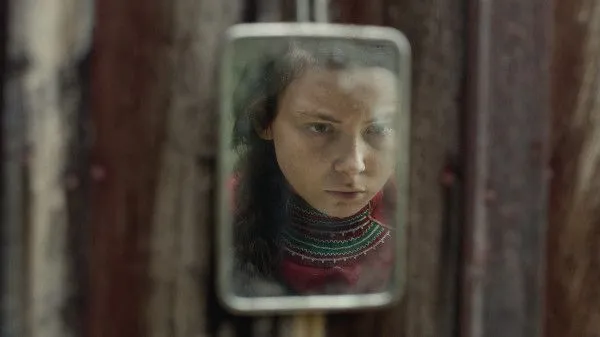Eye For Film >> Movies >> Sami Blood (2016) Film Review
Sami Blood
Reviewed by: Sarah Artt

First-time feature director Amanda Kernell delivers a powerful coming-of-age tale in Sami Blood.
Films dealing with difficult, willful girls are now both popular and getting critical attention: from the mainstream success of The Hunger Games, to The Force Awakens, to Girlhood/Bande Des Filles (2014) and Mustang (2015) stories of girls are now being told, and fortunately many of these films are being helmed by women.

Sami Blood/Sameblod begins in the late Nineties/early 2000s, with the elderly Elle Marja (played with superb intensity by Maj-Doris Rimpi) returning to her ancestral Lapland on the occasion of her sister's death. Her son and granddaughter are baffled by her fierce resistance to the occasion. But they have no idea what their mother and grandmother has gone through. The film then tells Elle Marja's story, of everything and everyone she has left behind in order to become who she is.
The bulk of the story then moves to take place in the 1930s. Teenage Elle Marja (a by turns ferocious and compelling Lene Cecilia Sparrok) and her younger sister Njenna (Mia Erika Sparrok) journey from their family's reindeer camp to a residential school several miles away. At school, speaking Sami and the traditional singing practice of yoiking are forbidden. Marked out by their traditional dress, the school children are subject to constant scrutiny and racist remarks from the neighboring villagers. One of the harshest moments occurs when a team of anthropologists visits the school. The children are treated like animals: their teeth are inspected, cranial measurements and notes on skin colour are taken down. Finally, all the girls are forced to disrobe so their naked bodies can be photographed. As her seemingly kind teacher looks on, Elle Marja is the first of her classmates to be subjected to this treatment, and the sound of the camera's flash is manipulated to evoke the lash of a whip, reinforcing the cruelty of the gaze.
A quick student of Swedish, Elle Marja fully understands all that is being said about the Sami, and she soon absorbs the language of structural inequality. She runs away from the school to Uppsala, seeking to pass as Swedish by giving herself a new name, burning her traditional clothes, and lying about her origins. She eventually manages to enroll in a girls' school but the burden of her masquerade is constant. No longer accepted by her family, who now see her as having become Swedish, Elle Marja must make a new life for herself at the expense of rejecting her heritage.
The film makes clear that Elle Marja's decisions are driven by a desire to survive and to learn. After being told she can never become a teacher or attend university if she has attended the residential school, she becomes even more determined to pass as Swedish and to run away. When she meets a handsome young Swede at a dance, she seeks him out at home in Uppsala as a foothold in her desperate plan to get away. Elle Marja's transformation from inidigenous to passing body is effected through a number of bodily actions that are accorded special attention in the film: sequences of bathing and putting on dresses that she steals from other women are significant. This attention to the often silent actions that comprise the donning of feminine identity aligns the film with the work of other recent filmmakers like Céline Sciamma and Deniz Gamze Ergüven. Elle Marja's transformation is completed when she enrolls in a girls' school in Uppsala and a new classmate offers to make her up with lipstick and mascara - a feminine ritual that cements her new identity she as 'Christina'.
This is a powerful film that not only resonates with the recent cycle of films concerning rebellious girls, but with films made by indigerous peoples. Audiences who were moved by Samson And Delilah (Warwick Thorton 2009) or who are familiar with the growing body of filmwork being made by indigenous filmmakers in Canada will find much to admire here. Director Amanda Kernell is herself of Sami and Swedish descent and her position brings an authenticity to this story and its complex representations of girlhood, femininity, race, and ethnicity.
Reviewed on: 25 Jun 2017















